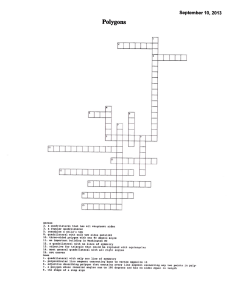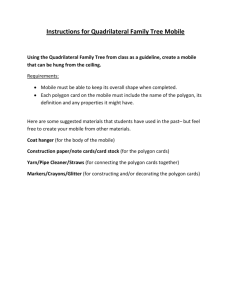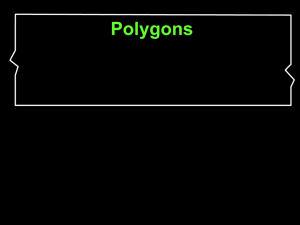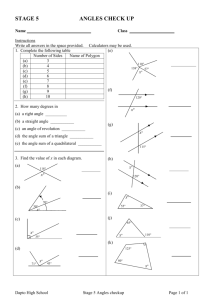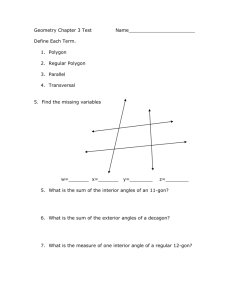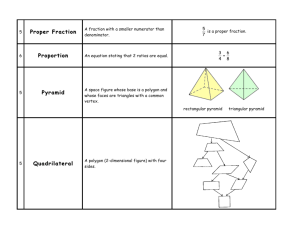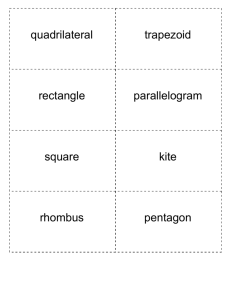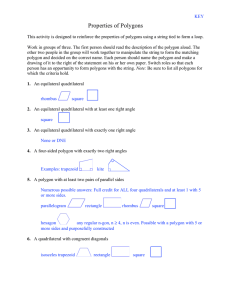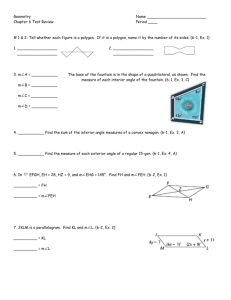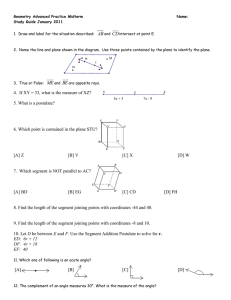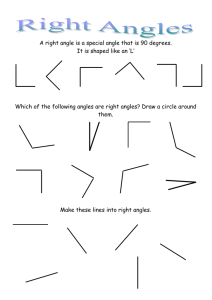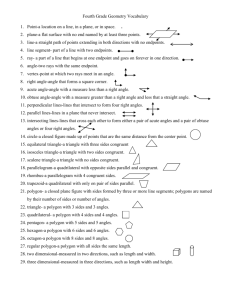File
advertisement
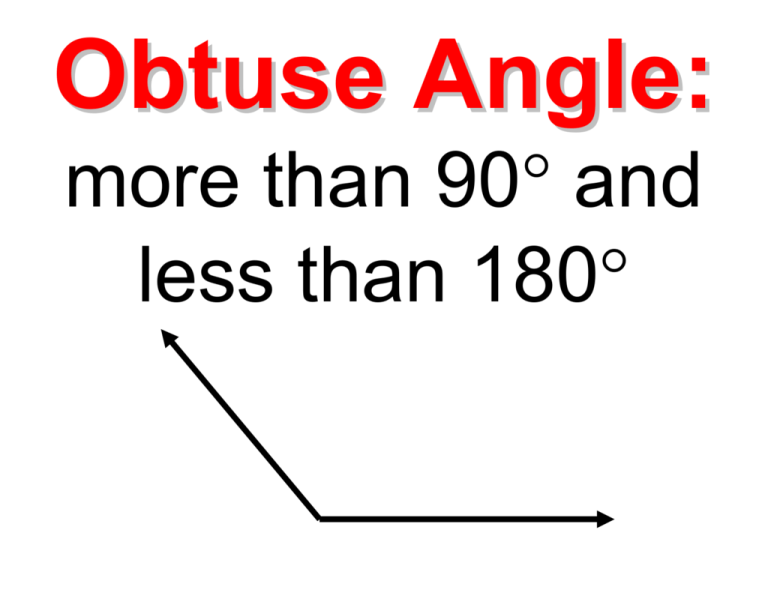
Obtuse Angle: more than 90 and less than 180 Acute Angle: less than 90 Right Angle: exactly 90 Perpendicular Lines: lines that meet or cross to form right angles Intersecting lines: lines that cross or meet Line of Symmetry: a line you can fold a figure along so that both halves match exactly (opposites) Multiples: the products of… a number multiplied by any other numbers 4: 4,8,12,16,20,24,28,32… 9: 9,18,27,36,45,54,63,72… Least Common Multiple: the smallest multiple that a set of numbers share LCM of 2 & 3 is 6 Composite Number: a number that has more than two factors 15: 1,3,5,15 36: 1,2,3,4,6,9,12,18,36 Prime Number: a number that has only two factors… 1 and itself 2, 3, 5, 7, 11, and 17 are prime numbers Product: the answer to a multiplication problem 3 x 5 = 15 15 is the product Factor: a number in a multiplication problem 2 x 9 = 18 2 and 9 are factors of 18 Factor Pairs: two numbers that are multiplied to get a product factor pairs for 12 6 x 2 3 x 4 1 x 12 Greatest Common Factor: the largest factor that a set of numbers share GCF of 12, 18,and 30 is 6 Mean: (find the average) 1. add all the numbers 2. divide by how many numbers you added Range: LARGESTminus smallest Number number 2, 6, 8, 1, 7, 9, 12 12 – 1 = 11 Median: the middle number when listed from smallest to largest 0, 3, 4, 6, 9, 10, 12 Mode: the number that occurs Most Often 3, 9, 1, 10, 3, 4, 7, 3 Equivalent Fractions: fractions that have equal value 1 = 2 = 3 2 4 6 Ratio: comparing two quantities 3:4 3 to 4 ¾ Face: a flat surface of a solid face Edge: the line where two faces of a solid meet edge Vertex: corner point of an angle, polygon, or solid figure Base: a special face of a solid Congruent: same size and same shape Similar: same shape, but different size Quadrilateral: a polygon with four sides Trapezoid: a quadrilateral with one pair of parallel sides Square: a quadrilateral with 4 equal sides, 4 right angles, & 2 pair of parallel sides Parallelogram: a quadrilateral with 2 pair of parallel sides Rhombus: a quadrilateral with 4 equal sides and 2 pair of parallel sides Rectangle: a quadrilateral with 4 right angles and opposite sides are parallel and equal Regular Polygon: a polygon with all equal sides and angles Irregular Polygon: a polygon with unequal sides or angles X-axis: the horizontal line on a coordinate graph X- axis Y-axis: the vertical line on a coordinate graph Y- axis Translation: slide Rotation: turn half turn Reflection: flip Area of Rectangle: square units inside length x width Area of Parallelogram square units inside base x height Area of Triangle: square units inside ½ (base x height) Ordered Pair (x,y) right then up (“over then up”) Perimeter: measurement around the outside side + side + side+ side (add all sides together) Circumference: measurement around the outside of a circle Volume: cubic units inside length x width x height (add ALL cubic units) Fraction: a part of a whole numerator 1 denominator 3 Improper Fraction: numerator is 12 greater than 5 denominator from a fraction to a decimal do the division ¾ 34 .75 from a decimal to a percent multiply by 100 .75 100 = 75% Properties for addition and multiplication: identity: equals itself 4+0=4 7x1=7 commutative: any order 7 + 9 = 9 +7 3x5=5x3 associative: grouped any way (3+7)+5 = 3+(7+5) 5x(2x6) = (5x2)x6 distributive: product of number and sum is equal to sum of two products 4x(2+5)=(4x2)+(4x5) Greater than: 8 >2 Less than: 4< 9 Rounding: 1. find your place 2. look next door 3. 5 or greater, add one more 4. digits in front stay the same 5. all digits behind zero is your name Round to nearest thousands: 23,467 to 23,000 45,899 to 46,000 Line: A B AB Line Segment: P Q PQ Ray: Y Z YZ Radius: line from center to outer edge Diameter: line from edge to edge passing through the center Order of Operations: 1. ( ) or √ 2. X or ÷ (from left to right) 3. + or – (from left to right) Diagonal: line connecting two vertices Probability: the chance an event will occur favorable outcome possible outcome 2 6 “There is a 2 out of 6 chance to land on blue.”
